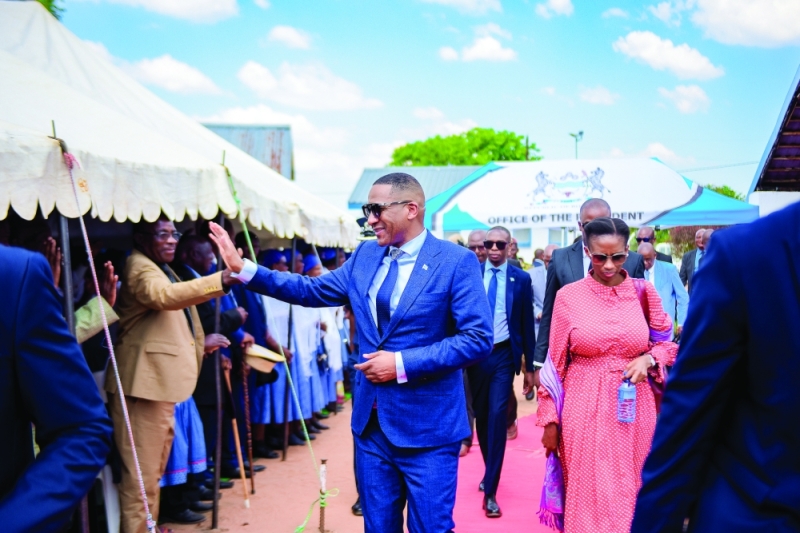Boko says women are provocateurs in GVB
Pini Bothoko | Tuesday April 22, 2025 13:17


During a recent kgotla meeting in Kgagodi village, Boko urged women to be mindful of the words they use when communicating with men. President Boko, who once said that Botswana is a violent nation, warned that verbal provocation often contributes to physical violence in relationships. He acknowledged that women may lack physical strength compared to their male counterparts, but said their words can sometimes be more damaging. President Boko noted that in many domestic disputes, women tend to use language that belittles and emasculates men, especially during emotionally charged moments. “Basadi ba tshabelelwa ke go dirisa mafoko a nyenyahatsang banna, mafoko a a kgobang. These hurtful words have led to escalating fights, some of which end in serious injuries or even death. When a man loses his job, for instance, he is often treated with less respect at home, contributing to tensions in the relationship,” Boko said. Boko stressed that this form of emotional abuse is frequently overlooked but plays a significant role in the outbreak of violence in households. He called for behaviour change, warning that family members, children, relatives, and even neighbours are often aware of the ongoing conflicts behind closed doors, which can have long-term consequences.
“Usually GBV occurs in secret places and we only come to be aware of it when incidents like deaths and serious fights have occurred, despite some people having witnessed it and choosing not to talk or report such incidents. It is everyone’s responsibility to help curb GBV, and I am pleading with every citizen to play a part in ending GBV by reporting such incidents when they occur,” he said. He said policing these private spaces is not easy, calling on close family members to report these incidents. He further pointed out that children living in such environments are affected mentally and emotionally, with many under-performing in school due to the trauma they experience at home. “Some children are not doing well academically because of the constant fights between their parents. This issue should be treated as a national concern; let’s all join hands to curb GBV,” he said. Boko encouraged the public to report signs of domestic unrest before they escalate into violence. He said early intervention is key and could prevent tragedies. In addition, Boko advised couples in toxic or failing relationships to walk away rather than stay in abusive situations.
He observed that many GBV cases occur in romantic relationships, particularly among partners who are unwilling to let go even when the relationship is no longer working. “If you see a couple constantly fighting or showing signs of abuse, speak up. We must intervene before things get worse. Moreover, if a relationship is not working, it is better to walk away because most of these GBV cases stem from lovers who can't let go and end up hurting each other,” he said. Boko also turned his attention to violence between men, especially in entertainment areas such as bars, shebeens, just to mention but a few. He said he is worried about incidents of men killing each other over trivial arguments during drunken disputes. “Our society is angry. Men are quick to stab and kill each other during fights. There’s a lack of self-control amongst members of the public, especially men, because every week they kill each other over beer drinking disputes. It seems like we are a nation that leads with violence instead of dialogue. This shows that we are hurting as a society. Re chaba e eteleditseng dikgoka le ntwa ko pele go na le go buisana,” Boko said, reinforcing the need for dialogue over violence.
He further pleaded with Batswana to learn better ways of resolving conflict and managing anger, both at home and in public spaces. Boko emphasised that national healing and peace must begin with how individuals treat and communicate with one another. Recently, when responding to a question before Parliament, the Minister of State President, Moeti Mohwasa, revealed that 1, 463 murder cases were recorded in the past five years. The police have in the past revealed that many of these murders stem from seemingly minor disputes, often fueled by alcohol consumption, love-related conflicts, and other petty issues. Batswana are worried about the shocking statistics, which paint a severe picture of a country struggling to curb violent crimes despite various crime prevention initiatives. Through community outreach, kgotla meetings, members of the public have on several occasions been challenged to resolve conflicts peacefully and to avoid solving disputes through violent means, and to take an active role in preventing violence. However, across social media platforms, members of the public continue to point out that underlying social and economic factors, including unemployment, poverty, and substance abuse, contribute to violent behaviour. The public suggests that addressing these root causes through social programmes, mental health support, and youth empowerment initiatives could help reduce crime rates.
